The POSEIDON workshop was held from 23rd to 25th of September in Teddington, UK. The main goals of the workshop was to involve other European countries and to convey the ideas of the POSEIDON project to other potential partners and to present achievements to date and gainfeedback on ideas and prototypes.
Round table discussion
While people with Down syndrome tested the POSEIDON services, the remaining workshop participants took part on the round table discussion and talked about the following points:
- Usefulness of the POSEIDON project
- Usefulness of the apps
- Usefulness of the social network and the ecosystem
- Usefulness of the POSEIDON framework for third party developers
- Will users be willing to pay for POSEIDON services?
- The role of DSI and EDSA
- How POSEIDON will influence policy makers? What actions are we going to take?
The results are summarized below.
Usefulness of the POSEIDON project
The general perception is that projects like POSEIDON and what they are trying to achieve is very useful, both for the target group and their relatives and carers. However, technology is not the answer to everything. Some stated that social interaction is more important than technologies. The view on technology is probably a generation issue. Elderly people tend to have a more sceptic view on the benefits of technology than the younger generation.
Our guest from the the Scotts Project Trust said that subscription services are not useful for POSEIDON, as the use is too limited. Down syndrome is just a niche. More applications are necessary. How to bridge the gap, i.e. scaling from Down syndrome community only to other marketplaces, e.g. other disability groups, is unclear. How to generate revenue streams is unclear with the current structure. However, it was also said that there are means of marketing such a framework, exhibitions for products, various conferences could be used. EDSA as a central unit to facilitate market communication was, not unexpectedly, mentioned. Smart tourism was mentioned as a potential use case.
There were comments on the workload the POSEIDON services imposes on the Secondary Users. Keeping it updated for the Primary User becomes another job for the Secondary User. Current using is very time consuming.
The French guest said that POSEIDON is a good tool to learn – it helps to climb more steps towards independence.
It was encouraging to hear that the main impression was that POSEIDON is living up to the expectation. The project is on the right track, “some form of smart technology is the way to go future”. Some apps need more work, but technology and the POSEIDON approach is the future.
Usefulness of the apps
All the apps were considered useful. However, the skills of people with Down syndrome is varying. One size doesn’t fit all.
Navigation is useful if persons are going to new places, and an additional effect of the navigation, was the Primary Users became more interested in maps in general. One of the parents commented that: “Navigation was nice – extension to public transport required.” Travelling to the social meeting independently is important. The navigation app is especially useful when persons with Down syndrome are travelling to new and unknown destinations. It becomes important to set new goals.
There were high expectations to the shopping app and the money training. It became clear that this was a function with huge potential. This was further pinpointed in interviews with people with Down syndrome at the workshop. It was a pity that technical problems prevented thorough testing of the shopping app.
It was also commented that no product can be 100% useful to 100% of the target spectrum.
Usefulness of the social network and the ecosystem
One of the parents said social network functionality is very useful for some. However, the population in the social network was to limited in the pilot, and the full effect was difficult to judge. Some commented that Facebook functions well, and they didn’t see the use of just another social platform. They were not concerned about the risks with Facebook.
Adding content is the key to success. Add more social media aspects. Exploit user filtering for common social networks, Facebook contact filtering.
A controlled social network in the app is interesting. Scale is important. How can you moderate a social network, by algorithm or people?
The social network was meant as a communication medium between families and the carers in the pilot period. To report shortcomings and other problems. This did not function well enough, not due to the quality of the implementation, but due to lack of awareness. That was a pity.
A representative from EDSA said that people with Down syndrome can benefit from the research, but who will pay for the services. Family? Government?
Usefulness of the POSEIDON framework for third party developers
The Scotts Project Trust participated at the workshop. The vision of Scotts Project trust is that people with a learning disability gain the confidence they need to lead fulfilled, happy and independent lives. To develop services for this group is one of the goals of the trust.
The POSEIDON framework was judged as a benefit for developing ICT services for the target group. There was bilateral discussions between the WP5 leader and the representative from the trust.
The Scotts Project Trust claimed that apps are very exciting for learning disabilities. However, we are not there yet. Perhaps the POSEIDON framework could support more developments for the target group.
Will users be willing to pay for POSEIDON services?
As mentioned earlier, and especially underlined by our guest from the Scotts Project Trust, subscription services are not useful for POSEIDON, as the use is too limited. Down syndrome is just a niche.
However, the ecosystem idea was appreciated, and the Scotts Project Trust was eager to collaborate in this direction. It has the potential to create a larger footprint and market starting from the experiences gained in the POSEIDON project.
Important questions to answer is how to go from project to product. The Down syndrome associations in the project would have liked to see prototypes closer to a product, and we must admit that there is some ground top cover before we have a close to 100 % reliable product. There are also issues who do the configuring and allocates user accounts. This needs to be focused in the period of productization.
The project has performed willingness to pay surveys. There is a willingness to pay to have a single point of access for quality information and services for the target group. This was confirmed by the people in the round table.
The role of DSI and EDSA
Down Syndrome International will take a role in creating awareness. The European Down System Association will probably take a role in providing the POSEIDON ecosystem services to the Down syndrome community in Eurrope. This is based on a business model that will generate revenues for the national interest organisations for Down syndrome in Europe.
How POSEIDON will influence policy makers? What actions are we going to take?
The European Diasability strategy says that around 80 million people in the EU are disabled. It is important to get the following message through to the politicians:
People with disabilities have the right to participate fully and equally in all aspects of life, both in the economy and society as a whole. However, in practice they continue to face barriers in everyday life, both physical and in terms of attitudes. More than 50 million people suffer from cognitive disabilities. 0,5 million with Down syndrome, 5,5 million people with Asperger, 42 million with learning disabilities (e.g. dyslexia, dyscalculia) and 7 million with diagnosed dementia. In addition, there are large groups of elderly with mild cognitive impairments.
Relatives to people with cognitive disabilities are often organised in interest groups on both a local and national level. Volunteers, often with close family relations to the person with disability, run the groups. These organisations are important actors to help integrate cognitive disabled people into the society, to improve their social and economic situation and to help relieve the caregiver burden. The economic situation for the interest organisations is weak, and the organisations do not have the resources to follow up their members appropriately.
It is widely believed that ICT tools and services may help to improve the instrumental activities of daily living for elderly and cognitive disabled people, e.g. help elderly people to be able to live longer in their own home or help cognitive disabled people to become more independent and increase the possibility of getting a job.
However, several years of experience has documented that wide market access for products directed towards vulnerable user groups is challenging. The EU disability strategy claims, “There is a strong business case for making services and products accessible to all, given the demand from a growing number of ageing consumers.” Today the market for services, for all groups with intellectual disabilities, is fragmented, heterogeneous, and difficult to penetrate.
This message must be communicated through the Down syndrome community in each European country. EDSA is the vehicle for doing this, and POSEIDON is part of this story.
The participants
Four adults with Down’s syndrome and their families were invited, one from France, one from Ireland and two from UK. They tested the POSEIDON system during the workshop and gave valuable feedback to the project. Two representatives from the European Down Syndrome Association, one from Germany and one from Spain, were present. The discussions with our guests was inspiring and contributed thoughtful ideas on the potential impact of the POSEIDON project and how POSEIDON achievements could be brought to market.
The workshop was organized by The Down Syndrome Association of England, Wales and Northern Ireland at their premises, the beautiful Langdon Down centre in Teddington. This also houses a museum of learning disability.
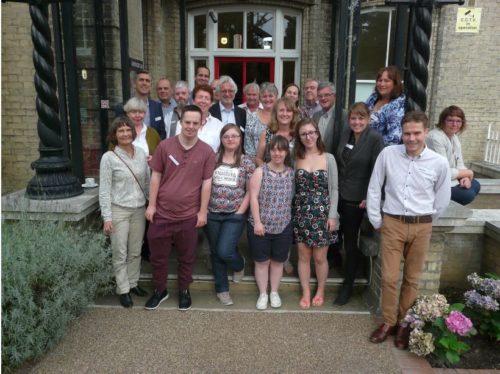
The group of delegates who attended the workshop outside the Langdon Down Centre in Teddington.
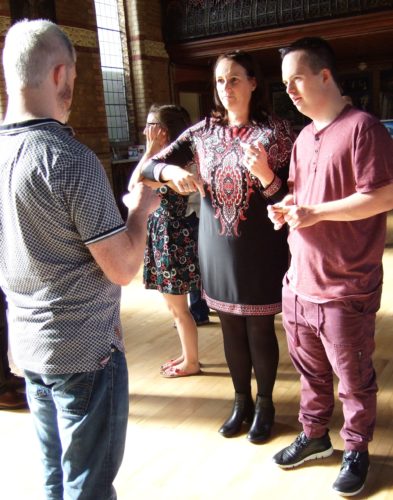
Icebreaking activity in the morning.
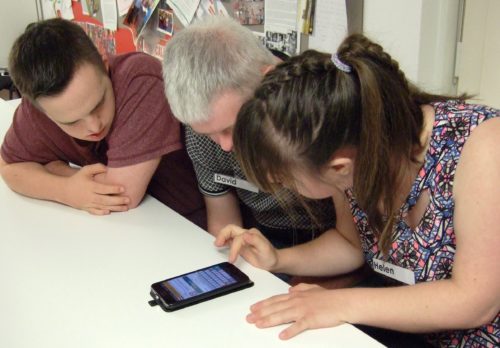
Helen is demonstrating how to use the calendar.
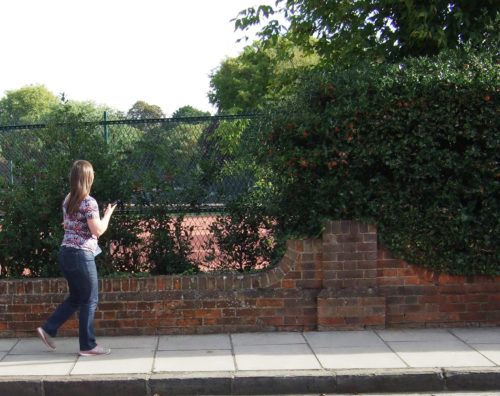
Maud using the navigation app.
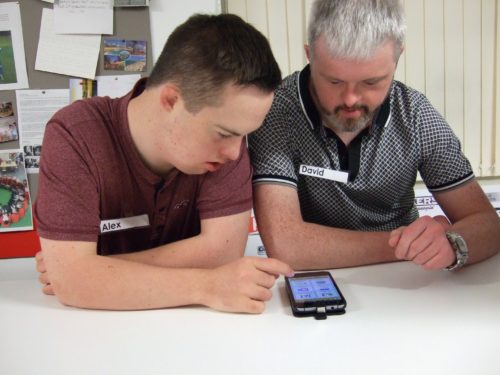
Alex is demonstrating how to use the POSEIDON app.
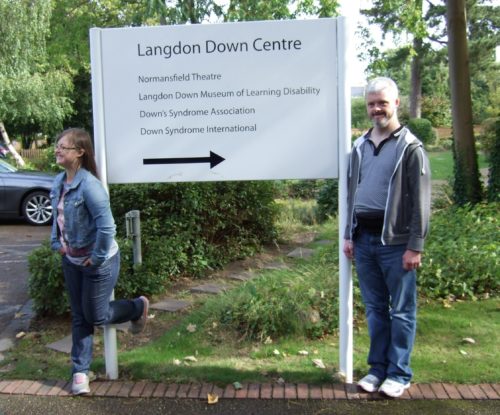
The guests from France and Ireland after the workshop.